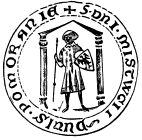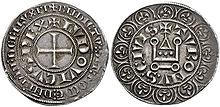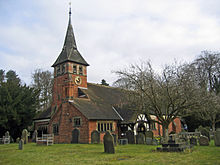1266
Portal history | Portal Biographies | Current events | Annual calendar
◄ |
12th century |
13th century
| 14th century
| ►
◄ |
1230s |
1240s |
1250s |
1260s
| 1270s
| 1280s
| 1290s
| ►
◄◄ |
◄ |
1262 |
1263 |
1264 |
1265 |
1266
| 1267
| 1268
| 1269
| 1270
| ►
|►►
| 1266 | |
|---|---|
|
Charles I of Anjou defeated a German-Sicilian army under Manfred of Sicily in the battle of Benevento .
|
|
| 1266 in other calendars | |
| Armenian calendar | 714/715 (turn of the year July) |
| Ethiopian calendar | 1258/59 |
| Buddhist calendar | 1809/10 (southern Buddhism); 1808/09 (alternative calculation according to Buddha's Parinirvana ) |
| Chinese calendar | 66th (67th) cycle
Year of the fire tiger丙寅 ( at the beginning of the year wood buffalo 乙丑) |
| Chula Sakarat (Siam, Myanmar) / Dai calendar (Vietnam) | 628/629 (turn of the year April) |
| Iranian calendar | 644/645 |
| Islamic calendar | 664/665 (turn of the year 1st / 2nd October) |
| Jewish calendar | 5026/27 (September 1st / 2nd) |
| Coptic calendar | 982/983 |
| Malayalam calendar | 441/442 |
| Seleucid era | Babylon: 1576/77 (turn of the year April)
Syria: 1577/78 (turn of the year October) |
| Spanish era | 1304 |
| Vikram Sambat (Nepalese Calendar) | 1322/23 (turn of the year April) |
The year 1266 brought the end of the Hohenstaufen rule in southern Italy . The Hohenstaufen Manfred is defeated in the battle of Benevento . His opponent Charles I and with him the House of Anjou , supported by Pope Clement IV , took control of the Kingdom of Sicily and the Principality of Taranto .
In the Kingdom of England , King Henry III. finally through against the rebellious barons and subject them to the Dictum of Kenilworth . The last members of the rebellious noble family Montfort-l'Amaury leave the country for France.
At the other end of the world, the Venetians Niccolò and Maffeo Polo arrive at the court of Kublai Khan in China after more than a year and are warmly welcomed there.
Events
Politics and world events
Kingdom of Sicily
- January 6th: Charles I of Anjou is crowned King of Sicily and Prince of Taranto by five cardinals in Rome . The coronation takes place with the consent of Pope Clement IV , who, however, does not enter Rome during his entire pontificate due to the fighting within the Roman nobility . Karl's main army is now crossing the Alps.
- February 26th: Charles I of Anjou defeats a German-Sicilian army under Manfred of Sicily in the battle of Benevento . With Manfred's death in battle, the rule of the Hohenstaufen in southern Italy ends . Manfred's widow Helena Angelina Dukaina receives news of his death at Lucera Castle , flees in the direction of her home town Epirus , but is imprisoned in Trani with her children by the bailiff there and handed over to Karl von Anjou on March 6th.
- March 7th: Charles I and his troops enter Naples . He established a centralized and efficient administration here and relied largely on French officials, who exert extreme tax pressure on the population.
War of the Barons in England
- February 10: Simon VI. de Montfort fled his captivity in London to Winchelsea with his brother Guy . There he briefly leads a group of pirates and then goes into exile in France.
- May 15: Henry of Almain , a nephew of King Henry III of England, defeated at the Battle of Chesterfield . , a group of remaining supporters of Simon de Montfort , the so-called “disinherited”, and thus finally ended the Second War of the Barons . The leader of the disinherited, Robert de Ferrers , is captured. The surviving disinherited, including Baldwin Wake , Lord of Chesterfield, join the remaining rebels in the Isle of Ely .
- June: The siege of Kenilworth Castle by royal troops begins. After initial attacks have been repulsed by the defenders, Heinrich III orders. the blockade and starvation of the castle.
- Summer: Gilbert de Clare, 6th Earl of Hertford , is working with Crown Prince Edward and the papal legate Ottobono Fieschi to find a balance between the parties to the dispute.
- October 30: Heinrich III. submits the Dictum of Kenilworth as an offer of peace to the rebelling barons . In it, the king stipulates that, in compliance with the Magna Carta, he remains in full possession of his power and can exercise it freely. The Provisions of Oxford and other orders issued by the rebels under Montfort are declared void. Amnesty is promised to all rebels who submit within 40 days, and they can buy back their confiscated goods for a high price. At the same time, the king forbids them to continue the fight. Despite the harsh regulations, many rebels submit to the king, given the hopelessness of their situation. Others, however, continue the fight, including their remaining leaders who have been banned from the repurchase offer. Kenilworth Castle does not surrender until December 14th after the last supplies have been used up.
- July 2: In the Peace of Perth , King Magnus VI sells . from Norway after years of fighting the West Scottish islands to Scotland under Alexander III. and in return receives 4,000 marks sterling and an annual contribution of 100 marks. In return, Scotland recognizes Norwegian rule over the Orkneys and the Shetland Islands .
Central and Eastern Europe
- January 10th: After the death of his father Swantopolk II , Mestwin II becomes Duke of Pomerellen . He has to defend himself against the claims of his uncle Sambor II , while at the same time his cousin Barnim I of Pomerania marches into his territory.
- after June 12th: After the death of Heinrich II. his two sons Heinrich III. and Otto I. together, Prince of Anhalt-Aschersleben . Since both are still minors, their mother Mechtild von Braunschweig-Lüneburg is in charge.
- A noble uprising breaks out in the Duchy of Silesia - Breslau . This remains unsuccessful, but Duke Heinrich III dies on December 3rd. at the age of 39, possibly by poison. His successor is his son Heinrich IV under the tutelage of his uncle Wladislaw von Schlesien . He was elected Archbishop of Salzburg on October 6th and must first travel home from there.
- Heinrich I succeeds his late father Johann I as Count of Sponheim .
- The Archbishop of Cologne Engelbert II. Von Falkenburg assures the Jews of the city his protection.
Crusader States

- The Mamluks under Baibars I conquer the crusader city of Safed on the Sea of Galilee from the Knights Templar and make it the capital of northern Galilee . Pope Clement IV then intensified his campaign for a new crusade and received a promise from King Ludwig IX at the end of the year . of France .
- After the death of Andronikos II , his half-brother Georg Komnenos becomes Emperor and Grand Comnene of Trebizond .
Asia Minor
- August 24th: Mamluks under Baibars I defeat the kingdom of Lesser Armenia, allied with the Ilkhanate , in the battle of Mari and then plunder and devastate Cilicia .
Asia
- The Venetian traveling salesman Niccolò Polo and his brother Maffeo arrive at the court of Kublai Khan in Cambaluc after more than a year , where they say they are welcomed and received by the Chan. Equipped with a gold plaque, which grants them the right to provide provisions, guides and a hostel throughout the entire Kublais kingdom, they begin their journey home. The Mongolian Great Khan also gives them a message to Pope Clement IV to send him anointed oil from the Church of the Holy Sepulcher in Jerusalem and about a hundred Christian scholars to spread the Gospel among his subjects.
- Munetaka , 6th Shogun of the Kamakura Shogunate in Japan , is deposed and replaced by his two-year-old son Koreyasu . Like his father, he is a puppet ruler; the real power lies with the Hojo rulers.
City rights and first documentary mentions
- MARCH 12: The Fulda abbot . Berthon II of Leibolz gives Lauterbach in a contract with the Lords of Wartenberg , the town charter .
- Heinrich II. Von Anhalt-Aschersleben gives Aschersleben city rights.
- Today's Upper Austria is given the name Austria ob der Enns ( supra Anasum ) for the first time .
- The places Buckten , Burgistein , Flüelen , Holungen , Kappel am Rhein , Marktbreit , Winznau and Wolfwil are first mentioned in a document.
- The Hungarian towns of Kisszőlős and Somlószőlős are mentioned for the first time in a document.
economy
- King Louis IX of France had the grossus denarius Turonus ( thick denarius of Tours ) minted for the first time in his domain . Ludwig got to know the model of this silver groschen on his crusade in Acre in 1250. Due to the trade relations of the French, the Turnose causes numerous imitations along the Rhine in the German-speaking and Dutch regions. The name Groschen is also later derived from grossus denarius .
- The Bolten brewery in Korschenbroich is granted the right to brew beer at the Kraushof in Korschenbroich by the rulers at Myllendonk Castle .
Culture and society
- September: The last Staufer Konradin , son of King Konrad IV , marries eight-year-old Sophia , daughter of Margrave Dietrich von Landsberg , by procuration at the age of 14 .
- Jewish history in Cologne Archbishop . Engelbert II lets the Cologne Jewish privilege in stone chisel and Cologne Cathedral up.
- The Arab chess grandmaster Borzago plays simultaneously in Florence . Without looking at the board, he wins two games, the third ends in a draw.
religion
Church hierarchy
- May 9: Nicholas of Ely is elected to succeed Walter de Cantilupe , who died on February 12, as Bishop of Worcester . Already on June 8th, the king approves the election, although Nicholas is a supporter of the aristocratic opposition, and on June 18th the new bishop is given the temporalities of the Diocese of Worcester, giving up his previous spiritual offices. On September 19 Ely is by Archbishop Boniface of Canterbury consecrated bishop and in the September 26, Worcester Cathedral enthroned. Previously, on August 31, he was commissioned by the king to draft a peace plan with five other barons and clergy to finally end the Second Barons' War.
- July 24th: Albrecht II von Mutzschen dies. His successor as bishop of Meissen is Withego of Furra selected.
- December 26th: Seven days after the death of his predecessor Ruprecht von Querfurt , Konrad II von Sternberg becomes Archbishop of Magdeburg , but his papal confirmation is delayed by internal opposition.
Other religious events
- August 30th: Pope Clement IV with the bull Ea quae iudicio re-establishes the hermit order of the Wilhelmites, which was dissolved in 1256 and integrated into the Augustinian order .
- The English Crown Prince Edward donates the Cistercian monastery Vale Royal Abbey in Cheshire .
- Thomas Aquinas begins with his main work, the Summa theologica , which represents the climax of scholasticism .
Born
Exact date of birth unknown
- after April 14: Heinrich II. , Prince of Mecklenburg († 1329)
- Roger de Flor , Italian adventurer and mercenary of German origin in the service of the Byzantine Empire († 1305)
- Hermann VII , Margrave of Baden († 1291)
- Hethum II , King of the Armenian Kingdom of Cilicia († 1307)
- John of Brittany, Earl of Richmond , Breton-English nobleman († 1334)
- John Maltravers , English knight († 1341)
- Beatrice Portinari , Florentine banker's daughter and possibly Dante's Beatrice († 1290)
Born around 1266
- Hedwig von Kalisch , Duchess of Kujawy in Brest and of Sieradz, Duchess and Queen of Poland († 1339)
- Johannes Duns Scotus , Scottish Franciscan, philosopher and theologian († 1308)
Died
First half of the year
- around January 1st: Simon of Walton , English clergyman and judge, Bishop of Norwich
- January 10: Swantopolk II , Duke of Pomerellen (* around 1195)
- February 12: Walter de Cantilupe , Bishop of Worcester (* around 1195)
- February 12 or April 18: Amadeus Amidei (Bartholomäus) , Italian saint, founder of the order
- February 26: Manfred , Prince of Taranto, administrator in Imperial Italy and Sicily and King of Sicily (* 1232)
- February / March: John Gray , English nobleman
- probably March 4th: Loretta de Briouze , English nobleman and hermit
- March 7th: Kuno , Bishop of Minden
- March: Margaret de Lacy, Countess of Lincoln , English noblewoman (* around 1206)
- April 4: Johann I , Margrave of the Mark Brandenburg (* around 1213)
- April 14th: Rogero di Puglia , Archbishop of Spalato (* 1201/1205)
- April 23: Gilles von Saumur , Archbishop of Damiette and Tire
- May 27: Elisabeth of Braunschweig , Roman-German queen (* 1230)
- after June 12th: Heinrich II. , Prince of Anhalt-Aschersleben (* 1215)
Second half of the year
- July 24th: Albrecht II von Mutzschen , Bishop of Meissen
- 4th August: Otto of Burgundy , Lord of Bourbon, Count of Nevers, Auxerre and Tonnerre (* 1231)
- October 21: Birger Jarl , Swedish statesman, Jarl of Sweden and founder of Stockholm (* around 1210)
- October 29: Margarete von Babenberg , Austrian princess and queen of Bohemia (* 1204 or 1205)
- before November 7th: Hugh Bigod , English nobleman, Justiciar of the government of the barons (* around 1220)
- December 3: Heinrich III. , Duke of Silesia-Breslau (* 1227/1230)
- December 7th: John of Ibelin , Count of Jaffa, Lord of Ramla and Regent of the Kingdom of Jerusalem (* 1215)
- December 19: Ruprecht von Querfurt , Archbishop of Magdeburg
Exact date of death unknown
- Agnes , Countess Palatine near the Rhine
- Andronikos II. Komnenos , Emperor and Grand Comnene of Trebizond (* around 1240)
- Arigkbugha Khan , brother of Kubilai Chan's and Mongolian heir to the throne
- Fujiwara no Nobuzane , Japanese court painter (* 1177)
- Hugo von Chalon , Count Palatine of Burgundy (* around 1220)
- Johann I. , Count of Sponheim and Sayn
- Schibani Khan , Mongolian prince of the White Horde in southwest Siberia
Died around 1266
- 1266/68: Michael II. Komnenos Dukas Angelos , Archon of Epirus and Aetolia (* 1205)
- 1266/72: William of Sherwood , English logician (* around 1205)










